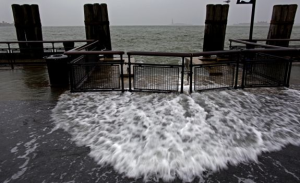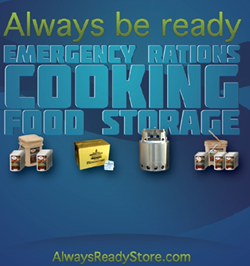Hurricane Emergency Preparedness
It is Hurricane season, and people who leave near coastal areas likely already have a Hurricane Emergency Preparedness plan. Local and National Government agencies along with insurance agencies, churches, and other non-profit and human service groups provide great information to help with Hurricane preparedness. If you live in an area that is sometimes affected by hurricanes, one of the most important things you can do to protect your family is to spend some time developing a plan. I know this, because I was ignorant and did not have a good plan in place and had to endure a terrible situation.
In 2004, my family lived in Southwest Florida and survived a direct and devastating encounter with Hurricane Charley. It was an event that changed our lives forever.
 Like many people who lived in South Florida, we had basic supplies stored and ready in case we were impacted by a hurricane. We also had a general evacuation plan, but even with all the hurricanes we had encountered over the years we had never been forced or felt it necessary to evacuate. Living in Florida for years we kinda became numb to the warnings. Obviously, that was ignorant and cost us dearly.
Like many people who lived in South Florida, we had basic supplies stored and ready in case we were impacted by a hurricane. We also had a general evacuation plan, but even with all the hurricanes we had encountered over the years we had never been forced or felt it necessary to evacuate. Living in Florida for years we kinda became numb to the warnings. Obviously, that was ignorant and cost us dearly.
As Charlie it made it’s way up the Florida coastline we were not in the projected path but when a sudden and dramatic turn occurred, Charlie now was barreling directly toward us with 150 mile-per-hour winds. It happened quickly and I’ll never forget the local news warnings that said “you do not have time to evacuate” so just do whatever you can to protect your life. That was a warning I hadn’t expected to hear.
Obviously, it was a pretty frantic time for our family. We grabbed the kids, huddled in a hallway, and pulled mattresses over us. As winds began quickly increasing, we could hear that damage was occurring all around us. Debris began to hammer our windows and doors as houses and structures were crushed by the fury of winds.
For several hours we were besieged by Charlie but the difficulty of that day lasted far beyond the brisk winds and heavy rains. In fact, the difficulty of that day still impacts us in profound ways.
I had always somewhat hoped to encounter a hurricane to see what it was like. Many people had talked about hurricane parties and the excitement of living through a hurricane. I was one of those people, and quickly found out how foolish I was when we were fearfully battling through the terrible storm.
The most difficult part of the hurricane came after the main force of Charlie had passed. Once the winds began to calm and we were able to emerge, we realized how fortunate we were to survive. Our roof had shifted (actually raised from the structure), our porch had collapsed, power lines were down all around us, and heavy debris was everywhere.
It was now time to deal with survival without electricity, and water. In sweltering 95 degree heat with no air conditioning, life was going to be rough. We were unable to travel because roads were littered with debris, but also there was no way of getting gas at stations without power.
For one week we battled without utilities, water, and other normal necessities. When gas stations finally were able to open, people battled lines of traffic in order to fill their tanks and get fuel for generators. Fist fights broke-out because people were angry from their battles with terrible living conditions. National Guard units were called-in to patrol streets and maintain the peace.
 The fact is, I thought my family was prepared for a hurricane. Turns out, we were only prepared to survive a minimal impacting storm. We had some food and water, but only for a few days.
The fact is, I thought my family was prepared for a hurricane. Turns out, we were only prepared to survive a minimal impacting storm. We had some food and water, but only for a few days.
Based on our difficult experience, I’d like to share some thoughts to help you better consider your hurricane preparedness plans.
If you live near the coast, you likely have a Hurricane There is nothing anyone can do when nature decides to leash out its fury. There is no way to stop it so people should heed the warnings, brace for the worse and seek shelter.
In order to minimize the loss of life, most towns and cities along coastlines have created emergency plans. Sirens are placed in strategic locations to announce a major evacuation; the emergency broadcast system is in place in the event that power and electricity has been cut off, and many agencies also stockpile food, water and medicine.
Those who live in the coastal communities will usually be battered by hurricanes. This happens between the months of June until November in the Atlantic and from May to November in the northern Pacific Ocean. When this is first spotted on radar, the forecaster will begin to inform the public about it. Obviously, hurricanes are erratic in their behavior, so it’s likely the trajectory path will not be very clear. There is no need to panic when your area is a potential target zone since weather conditions may change in the next few hours. But, begin planning and watch the system closely. If there are no improvements, it is time to activate your emergency procedures.
The hurricane may pack winds exceeding more than a 100 miles per hour which can make cars, pieces of metal, lawn furniture, trees, or wood cause severe damage to the home. It’s a good idea to board-up the windows and doors of the house with hurricane shutters and plywood. If you feel your home is secure enough and intend to stay in your home, you will need to get to the grocery store to stock up on food, water and other essentials. In addition to consumable items, you’ll also want to pick up candles, batteries for the radio and the flashlight, and fuel for the generator.
All of these things are necessary (especially water) to prevent dehydration. Water was the most essential item during our experience with Charley. People had purchased drinking water, but it simply was not enough for their needs. The sweltering heat (without air conditioning) created a far-greater need than most people had planned for. So, you will want to get plenty of water stored. In fact, you may want to fill every possible container (including the bathtub) to make certain you are able to last until utilities are restored.
Another vital item that must not be forgotten is a medical kit. This should have bandages and some antibiotics to be able to treat anyone who is ill or injured until the person can be taken to a medical facility for better treatment. If the hurricane is a devastating high-intensity storm, there may be a massive number of people overwhelming health-care facilities. Having a medical kit on hand for minor emergencies is essential.
Should the incoming hurricane be classified as a category 4 or 5, residents are advised to evacuate and seek higher ground. It will be a good idea to travel light so only a few pieces of clothing, food and water must be brought into the vehicle. It’s a good idea to have a bug-out bag (emergency backpack) always ready for a quick evacuation. In fact, you should pack several identical bags for each member of the family.
If you evacuate, you will want to leave plenty early. There will likely be heavy traffic so it is necessary to drive slowly and avoid panicking. You will not want to cause additional traffic delays by causing an accident.
The hurricane will pass within a few hours and depending on the severity of the damage you may be allowed to return home to assess damage. You’ll want to exercise extreme caution, as there will likely be broken glass or other sharp items that could cause you harm. In addition, snakes and other wild creatures may have been washed onto your property and will not be in a very good mood.
Emergency preparedness is key to properly dealing with a hurricane situation. People who live in a hurricane area typically know what to do, but may be numb to the constant warnings. Take it from a fortunate hurricane survivor and take the time to re-evaluate your hurricane preparedness plan. Also, those who are moving into the community should quickly prepare themselves and learn how to survive the onslaught of a hurricane.
My final suggestion is to rehearse your emergency preparedness plan to see if some improvements need to be made. Go through a quick evacuation plan. Practice procedures for staying in your home. You may also want to go so far as to cut off your electricity, water, and phone service to give you the full experience. This extra effort could save your life.







0 Comments